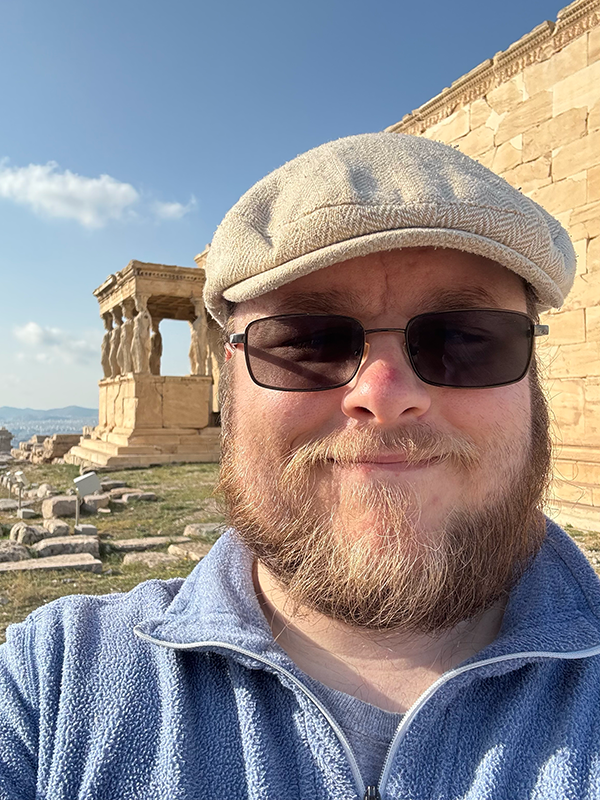
Get to Know Nicholas Lindberg
Nicholas Lindberg joined our department as Assistant Professor in Fall 2022. We asked Dr. Lindberg a few questions – see his answers below!
What drew you to studying the ancient Greeks and Romans?
I was interested in the ancient world from a very young age. I remember going to the elementary school book fair and getting books about the pyramids or the Roman Army. Nine year old me couldn’t have put it into words, but what was fascinating in those books was how very different the worlds they portrayed were. Multiple decades and degrees later, one of the things that still attracts me to the ancient past is that it is remote and alien, inhabited by people who often viewed the world very differently than we do. But adult me also appreciates how very similar the ancient world is to ours. Despite differences in outlook, the ancients dealt, like us, with problems involving government, economics, environmental change, and technological innovation. Many of their solutions have become part of our own society. It is this simultaneous difference and similarity that makes the ancient world perennially fascinating to me.
What classes or types of classes are you / will you be teaching at SCU?
As a historian, I teach a wide variety of courses on the culture and history of Greece and Rome. This quarter, I am teaching a course on the Roman Republic and a comparative course on ancient empires that looks at the empires of Egypt, Rome, and the Huns. Other courses I teach include a course on ancient Greek technology (“Scientists and Spartans”), a course on civil strife in ancient Greece (“Tyrants, Traitors, and Rebels”) and one on ancient Greek democracy (“The Democratic City”).
What research or professional development projects are you currently working on?
I’m currently working on an article about elite housing in Hellenistic Greece (323-31 BCE). This is a period in which the houses of the richest Greeks become larger and more opulent. In Athens and other democratic cities, there had previously been a strong egalitarian ethos that had limited the size of the houses even the richest citizens built. But changing ideas about how a politician should look (like a wealthy man able to provide benefactions to the city) and what he should be able to do (entertain foreign envoys from wealthy kingdoms) caused assembly-going citizens to choose men with larger houses for important offices. The politically ambitious therefore built ever more palatial houses to show their suitability for office, with the result that a magnificent estate eventually became a de facto requirement for political success. In pursuing what they perceived as the best type of politician for the needs of the moment, the citizens of Athens and other cities inadvertently weakened their democracies by excluding poorer citizens from important offices.
Who / what is your favorite Greek or Latin author / text, and why?
I’ve always liked Herodotus, the first Greek historian. What I like about him is his curiosity. He’s notionally writing a story about the Persian invasion of Greece. But along the way, he has such a genuine interest in the peoples and cultures that enter his narrative that he gets sidetracked constantly, about everything from how the Great Pyramids were built, to how Persian sacrifices worked, to whether or not the people of modern Afghanistan really used giant ants to dig up gold. His story could have very easily been a clear-cut narrative of good Greeks vs. evil ‘barbarians.’ But, from the very first page of his work, he shows not only a curiosity about what the Persian side of the story might be, but also a willingness to agree with the Persians over his fellow Greeks when he thinks the Persians are right. He displays the sort of open-mindedness and critical acuity that we moderns often like to pretend is ours alone. It makes him both delightful and humbling to read, which is why he’s also one of my favorite authors to introduce to students.
What is one activity you enjoy doing with your students (or your students enjoy doing) in your classes?
In my Democratic City class, I have the students take on the role of citizens in an ancient Greek city (“Santa Claropolis”). They select magistrates, and act communally as the citizen-assembly, following the rules and procedures of an ancient direct democracy. Each week, they have to solve a case study that I’ve drawn from the problems historical Greek democracies faced. So one week, for example, the city finds itself being extorted by a Roman tax collector. The tax collector is acting illegally, and the city could send an embassy to the Roman Senate to stop him. But the only ambassadors the Roman Senate is likely to listen to are the richest and most powerful citizens of their city. Do they send those citizens and risk them coming back even richer and better connected? Or do they all take a loss and pay the tax collector in order to preserve equality within their city?
I enjoy this exercise because it gets the students to appreciate the sorts of perils ancient democracies faced and, by extension, the ways in which members of all political communities have to balance short-term gains against long-term consequences. I suspect that, even if I added a dozen more inscriptions to the syllabus from ancient cities in the exact same predicament, their understanding of the problem would still be worse without the lived experience of it. For their part, the students enjoy the more active engagement assembly sessions provide. That they also avoid having a dozen extra inscriptions on the syllabus is, no doubt, all to the good from their perspective as well.
Favorite Holiday Tradition: Hiding the pickle ornament on the Christmas tree and then asking my daughter to find it. When she does, she gets a gift!